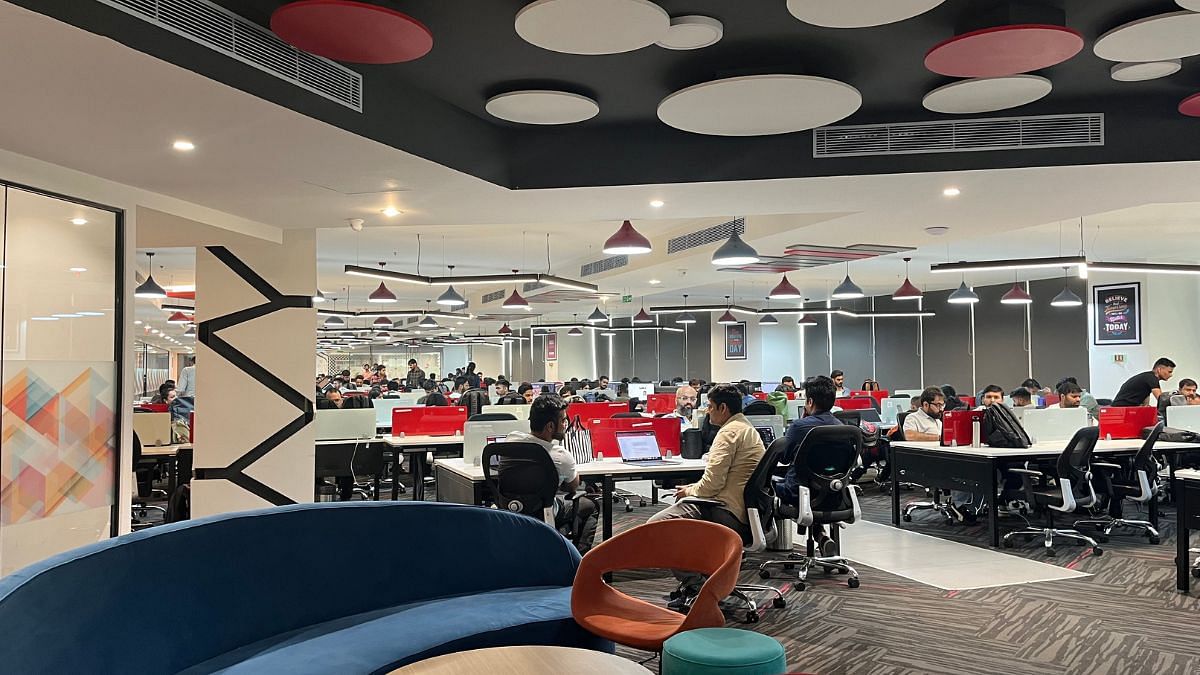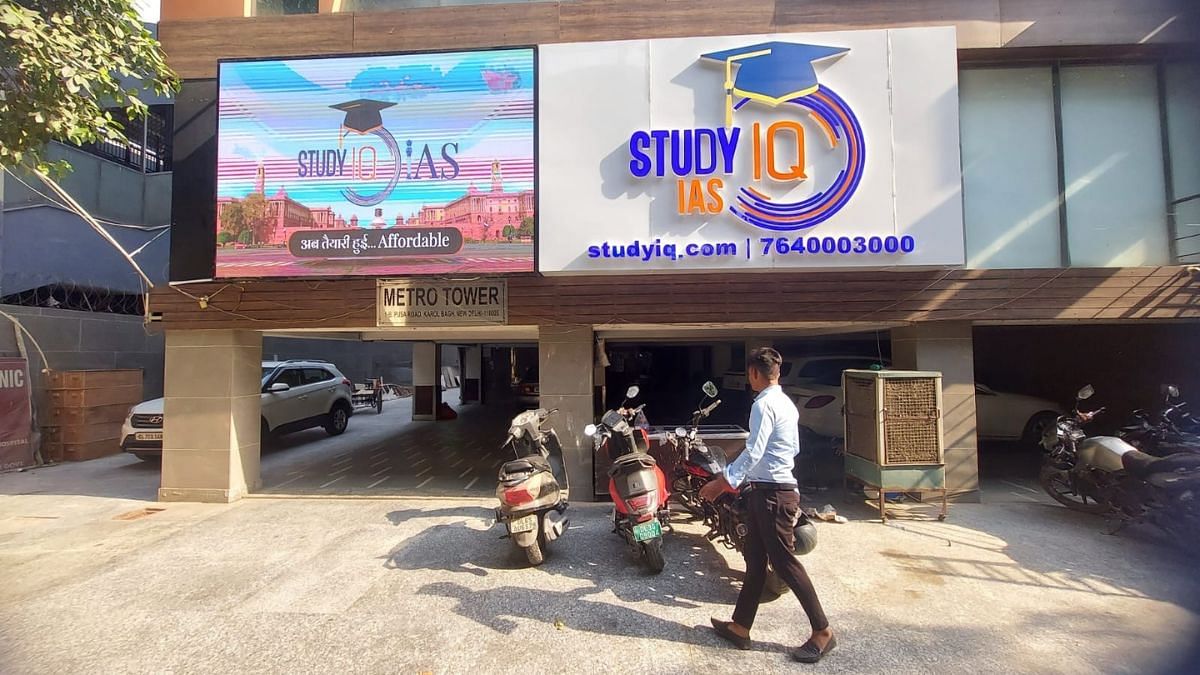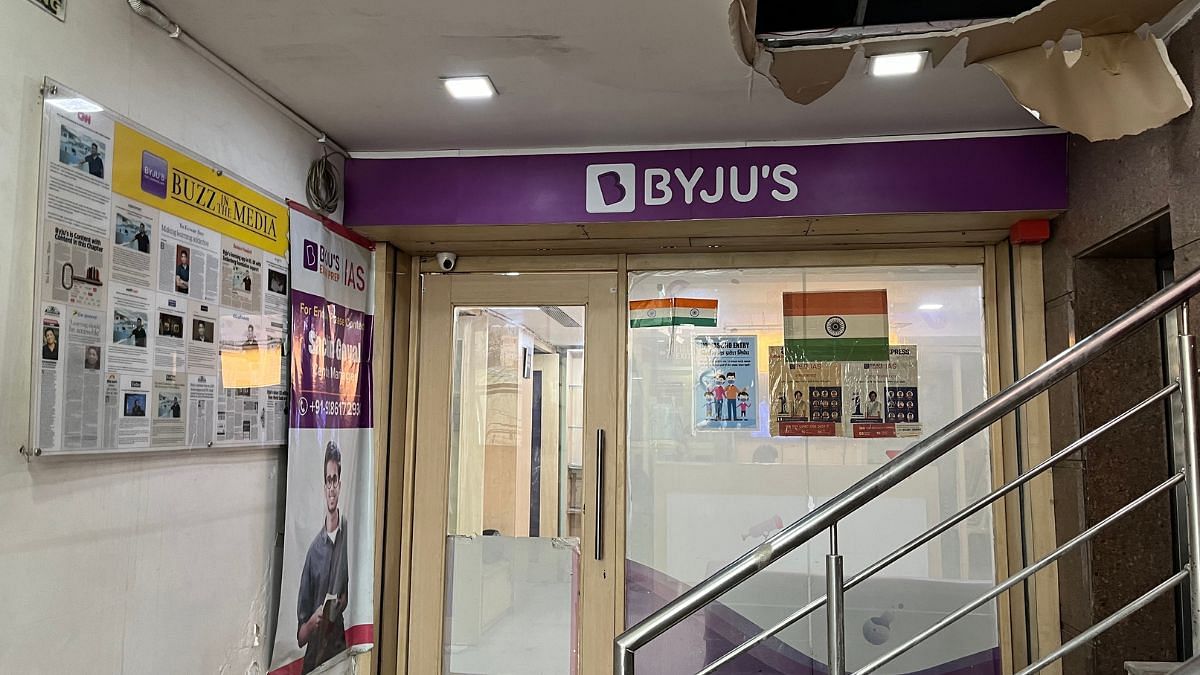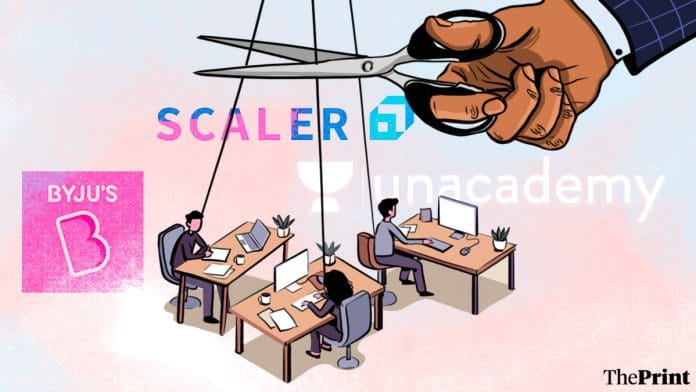Gurugram: Continental and Italian cuisines, expensive booze, colleagues grooving to DJ music, and a chance to brush shoulders with the founders at an upmarket Bengaluru club. For 28-year-old Aditi Jaiswal who works at an edtech company in India’s IT capital, all this was a quarterly affair. But now the booze has dried up and music stopped. Last such gathering sponsored by the company happened more than a year ago.
Two years ago, her employer that specialised in offering courses for UPSC preparation was acquired by a bigger player in the sector. New rules were set. Flaunting money, hiring big and breathless expansion were checked. And these made a direct impact on the work culture and employee well-being at the firm that has around 100 people. It’s no more the perky job Jaiswal used to brag about before her friends and family who were intrigued by the industry that has shrunk 400 sq ft classrooms in India into five-inch screens.
The irrational exuberance of the edtech industry is getting a reality check. Byju’s was only the beginning. Now the industry is rationalising, consolidating, and trimming down for a period of pragmatism. Jaiswal’s story is characteristic of a sunrise sector in India that saw a massive boom before flattening. It’s picking pieces after the crash of that high-growth-no-profit roller coaster and rewriting a syllabus that’s sustainable and has profitability as its main chapter. After a round of cut-throat competition to acquire customers that left all players bloodied, the industry is taking a predatory stance again but this time the goal is not to fight the competition but to simply end it through acquisitions. All this has caused an internal churn at these new age startups that now enter a phase filled with uncertainty. Pink slips, pay cuts, lengthy shifts, unrealistic targets, no appraisals, and a steeplechase for profits have begun in a sector that roared not so long ago and gave birth to unicorns regularly.
“I have been working here for the last four years now. The place has changed unrecognisably in the last year or so. They have started charging for the daily meals that used to be available for free. The work pressure has increased drastically. Work hours have been increased from 9 to 11, more review meetings are being held where everyone has to give the reasons for having not met the targets. And this is not the case only with our company. The entire edtech industry is going through this rationalisation,” said Jaiswal who is looking to change her job.
Jaiswal has faced two rounds of salary cuts since she joined the company in 2020 — first 10 per cent and then 20 per cent. And impossible looking KRAs chase her every day: more classes and higher sales targets to sell courses.
Funding has dried up from $4 billion in 2021 to under $200 million as of July 2024, propelling acquisitions and even shut downs. The edtech industry is going through a critical transformation and only a few big names are likely to survive in the end. From flamboyance to rationalisation, the industry is going through a period of shake-up.
I have been working here for the last four years now. The place has
changed unrecognisably in the last year or so. They have started charging for the daily meals that used to be available for free. The work pressure has
increased drastically
–Aditi Jaiswal, Bengaluru-based edtech professional
Unacademy, one of the largest edtech firms, has saved around Rs 50 lakh monthly by not paying for its employees’ food bills. StudyIQ is saving Rs 22 lakh monthly for the same.
“The edtech sector must now survive on its own as funding is becoming increasingly limited. Companies with high customer acquisition costs and weak unit economics will struggle to sustain operations. This is why we’re seeing consolidations and layoffs, and we may eventually end up with only a few dominant players in each sub-segment. The key challenge will be balancing growth with profitability,” said Kamlesh Vyas, a partner with Deloitte India.
If the phase of investor cash burn provided thousands of jobs to the Indian workforce, the consolidation period is undoing some of these gains. And the deal books don’t capture this cost.
“When a company is going into a loss, they lay off some people to show the investors that they are in the profits. They start doing cost cutting. They make a list of low performers and ask them to leave. Most of these people belong to sales and marketing departments and sometimes other departments such as Content and SEO are also given the targets. Salary cuts and shutting down courses that are not profitable are part of these measures,” said a teacher who used to work at Physics Wallah.
Major players like Physics Wallah and Adda 24 have acquired smaller startups such as StudyIQ, Veeksha, Success Ease and coaching institutes to consolidate their positions. The industry has seen over ten recent acquisitions, including Allen buying DoubtNut and Physics Wallah’s acquiring Xylem Learning.
Adda 24 merged the CA test preparation firm Ekagrata Eduserv. The trend is likely to continue, leaving only a few dominant companies standing as smaller firms either shut down or get absorbed.
But some deals are turning out to be mutually beneficial.
“They (Ekagrata Eduserv) needed the students and we had the students. We needed the course so they would provide us with the ready-made courses with the teachers. It is a win-win situation for both,” said Anil Nagar, CEO of Adda 24, one of the biggest edtech companies.

Also read: At 90, scientist CNR Rao is still driving breakthroughs at JNCASR. More research, less red tape
Harsh talk, bitter comments, and the chase for profits
When Byju’s, the poster boy of India’s edtech industry, came crashing down, it sent shockwaves throughout the sector. It was a red signal for venture capitalists vis à vis investment.
Fresh investments today are coming with endless conditions. And the industry too is changing their operational style to meet efficiency. They must survive on the revenue front and show profits.
Unacademy recently announced its pursuit of collaboration and simultaneously declared there would be no salary hike this year. Although these signs indicate challenges within the company, the founder Gaurav Munjal insists they are on track and will generate record revenue this year.
Unacademy employees say that the founder has been putting on hold many routine expenses. They have stopped sending teachers for the events in different cities, saving on fare and hotel charges. And teachers no longer receive goodies.
“There used to be an educator delight team of five-six people whose only work was to send gifts to the teachers: T-shirts, water bottles, big boxes of chocolates. It all used to be sent directly to the teacher’s house. The founder himself used to be involved in this. But now that team has been sacked,” said a former employee of Unacademy, on the condition of anonymity.
While Unacademy has decided not to go ahead with appraisals this year, its collaboration with Mahendra Singh Dhoni as the brand ambassador continues.

CEO Gaurav Munjal has been preaching ‘frugality’ for some time now. And it only shows the company was able to foresee the consolidation era. He started goal setting nearly two years ago.
“Until now we never had frugality as one of our core values…but now the goal has changed. We have to do an IPO in the next two years. And we have turned cash flows positive. For that, we must embrace frugality as a core value. Even though we have more than Rs 2,800 crore in the bank, we are not efficient at all. There are a lot of unnecessary expenses that we do. We must cut all these expenses,” Munjal had said in 2022.
Employees at another EdTech major Adda 24 say that harsh talk has been replaced by the bitter comments in review meetings that has resulted in employees leaving the company.
The older faculty at some of the companies had a contract under which they were expected to teach 50 hours a month. This excluded time spent on preparation for these lectures, content creation and doubts clearing sessions. In the new contracts being offered, teaching hours have been increased to 70 a month. And the older faculty members are being made to work on the week offs as well.
“It felt bad as the founder used to make harsh comments like ‘Tum logon ko paalne ke liye nahi baitha hu, kaam nahi karna to ja sakte ho’ (I am not here to feed you, if you can’t work, you can leave) after one point I used to feel like a salesperson, not a teacher, who has to bring admissions and sell courses,” a teacher who left StudyIQ IAS last year told ThePrint. The startup was merged with Adda 24 in 2022.
“It has just become about pure business and their focus is on generating more and more revenue.”
Earlier, the edtech used to run like a single proprietor firm; salaries were low compared to now but employees didn’t have to face cuts. There were no revenue targets. The focus was simply on content.
But Anil Nagar, CEO of Adda 24, is hopeful. He says players that keep their ear to the ground and respond to the need shall sustain.
“All the big players will remain in the race. The business models will be changed now. Whoever is fulfilling the genuine need will be successful, it shouldn’t be just about business,” said Nagar.
But Nagar agreed the layoffs are a sign something has gone wrong.
Earlier, founders used to talk to the faculty directly. But recently, I used to hear from them only when they wanted to scold the faculty
— former faculty member of Unacademy
More than 14,000 employees had been laid off in 2022 from the edtech sector. Many have left the industry on their own. While Unacademy laid off 250 people this year, Adda 24 fired 300 people in October last year. Another edtech startup Scaler laid off 150 people this year.
Salary cut is another approach the edtech sector has adopted to make their balance sheet look lean.
“Last year, we couldn’t meet our target revenue. A meeting was called. The management decided to cut my salary by 25 per cent. This was a very large amount of my salary as my annual package is more than Rs one crore. I had planned my finances as per that but now I have to change everything,” said a teacher working with an edtech major for three years.
Companies have made steep hikes in the price of their courses. For example, StudyIQ increased the fee for its General Studies course for UPSC from Rs 18,000 in 2022 to Rs 29,000 in 2023. But have settled at Rs 25,000 currently. On the other hand, Physics Wallah with its deep pockets tried playing a disruptor, launching a similar course at an affordable price point of Rs 15,000.
The founders were hands-on, engaged with faculty directly and gave pep-talk — like most start-up founders do. But of late, the conversations have become all about numbers.
“Earlier, founders used to talk to the faculty directly. But recently, I used to hear from them only when they wanted to scold the faculty,” said a former faculty member of Unacademy.

Also read: Delhi Amity School students wrote $36bn space dream. NASA took note, gave them a grand prize
High targets, low motivation
After being a digital marketing professional for seven years, Manish Kumar made a switch to an edtech company, finding it to be a lucrative sector. After giving four years as SEO director, Kumar was laid off a few months ago.
He used to head a team of 70 people and his annual take away was Rs 40 lakh. Gradually, the pressure of revenue-generation increased immensely. Work hours got longer, pressure increased and targets were set.
“They had to show that their company was profitable, so they laid off 15 people. It was the third such round of lay off in a span of 14 months and sadly I was among those unlucky people,” said Kumar, who has now opened his website providing SEO services.
Professionals like Kumar and Jaiswal have spent productive years of their careers in the edtech industry but are far from finding stability and security. They came to this sector with hope for personal growth, which they experienced briefly. But consolidation has changed the dynamic.
“If the sector is not doing well, it is not growing, and the funding is reducing, it’s obvious they will need smaller teams. Growth in salaries and expansion won’t happen. Companies must focus on keeping customer acquisition costs low and ensuring each unit they sell is at least not causing significant losses. Without profitability, layoffs become inevitable,” said Vyas.
The cost of surviving the transition is on the employees who are seeing their workplaces turn toxic. Some are looking for a way out of the industry.
The approach to achieve targets has become aggressive. On every 15 August, many companies offer discounts on their courses. This is the day of bulk sale. Earlier, target achievements were celebrated but now scolding sessions follow.
If the sector is not doing well, it is not growing, and the funding is
reducing, it’s obvious they will need smaller teams. Growth in salaries
and expansion won’t happen
— Kamlesh Vyas, partner, Deloitte India
“In 2022, we sold courses worth Rs 2.5 crore. In 2023, it was Rs 2.8 crore. But the target given by the company this year was unrealistic. We crossed Rs 3.2 crore but couldn’t reach Rs 3.5 crore (the target). The management called up a meeting and there was only bitter talk, not a single word about the team crossing last year’s number,” said an employee of an edtech company on the condition of anonymity.
Jaiswal complains of not having enough time for the family. The sectoral consolidation now feels personal.
“I don’t think I can work like this for long. I am unable to give time to my family. It was not like this in the beginning, my working hours were fixed with one hour of break but now I work 12 hours a day mostly and don’t get any appreciation,” said Jaiswal. “We don’t get any offs on 15 August, our working hours get extended to midnight.”
Also read: Rohtak med student influencer posted everything—including how a senior stalked, abducted her
Edtech going the ecommerce way?
Industry experts and edtech founders see parallels for the sector in India’s telecom and ecommerce story and believe the consolidation period will bring stability to the market.
“Consolidation gives stability in the market. It reduces competition and improves unit economics. And that is how big companies survived the transition period,” said a Bengaluru-based independent adviser who works closely with some of the leading edtech firms.
He gives the example of ecommerce and telecom sectors.
“In 2012 the e-commerce sector had around 30 companies and now there are two companies in the market– Amazon and Flipkart. The same happened with the telecom industry and the same is going to happen with the edtech industry,” he added.
Some of the founders too believe the industry will be stabilised and so will the job cuts.
“This is just a slowdown. That happened with many industries. This is a plateau. The incremental growth will start from here and the stronger player will survive,” said one of the founders of an edtech company on the condition of anonymity.
The road to consolidation hasn’t been that rocky for all players.
Physics Wallah has been doing well in terms of targets and work pressure. Most employees at the company get fixed days offs and have 9-hour shifts.
An industry expert credits this to Physics Wallah IAS offering low-price courses that make selling them easier. While StudyIQ charges around Rs 47,000 for a General Studies Foundation course, Physics Wallah IAS offers a similar course for around Rs 16,000.
“It is not that we don’t have the target pressure but we don’t have to struggle as much to meet the target as others. My friends in the other institutes are working in a toxic culture with immense pressure but we are not going through all that at least for now,” said a teacher who works at Physics Wallah.
In this cycle of acquisitions and mergers, smaller companies are exploring innovative ideas to survive this churn.
“I won’t say that this is an ideal situation. But yes, we are trying our best to come out of this situation. We are at a loss and not able to generate revenue. We had some options for merger but that would be our last option,” said a founding member of a small edtech company valued at Rs 45 crore.
As for employees at some of these smaller edtech firms, they fear for their jobs.
“We never know what is going to happen. I have been applying to the big companies for the job but there are no more leads in the section. Maybe after the consolidation period there will be opportunities but I don’t know whether my current company will survive till then,” said Neha Sharma, who works at a small edtech company, based in Karol Bagh.
Sharma joined this company as content team lead two years ago but the last six months have been stressful for her as firms either shut or are acquired.
“Some of the small companies partnered with the bigger ones but after that there had been some layoffs. So that is also not a safe option. Work and pressure are increasing every day. Maybe I should start looking for opportunities in a different sector. Maybe in IT.”
(Edited by Anurag Chaubey)






